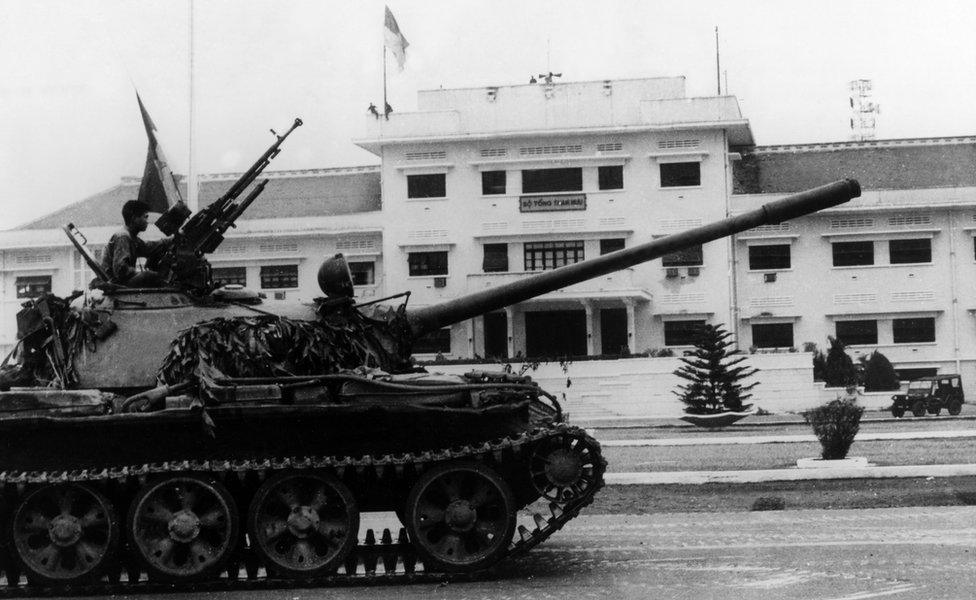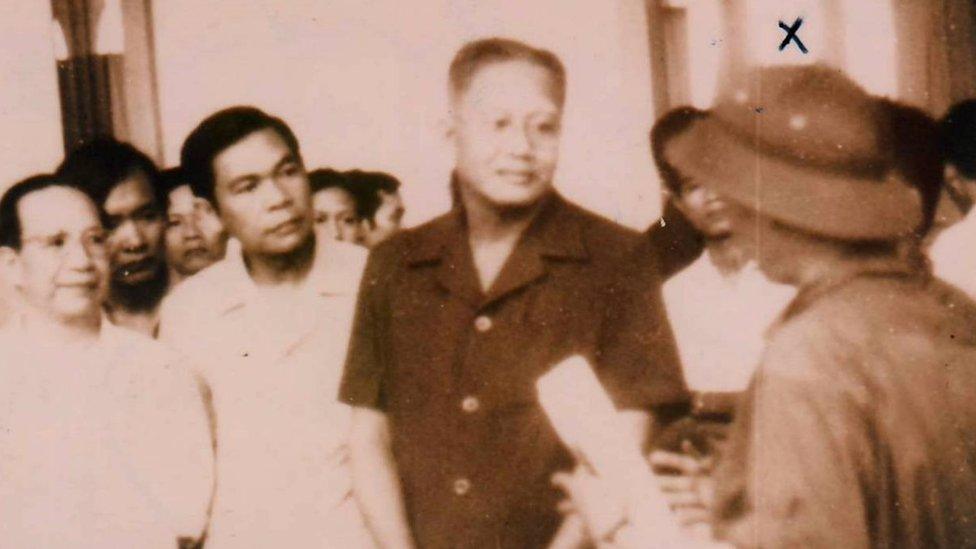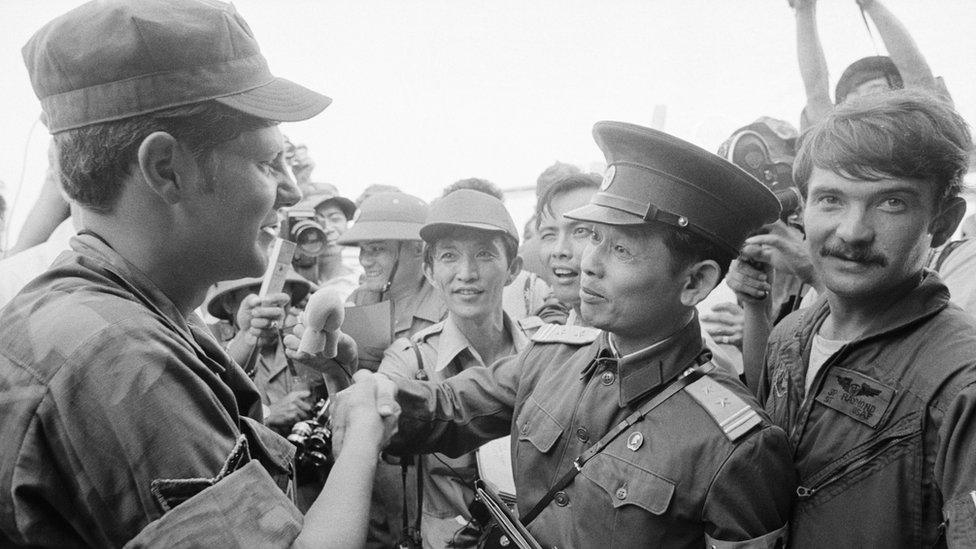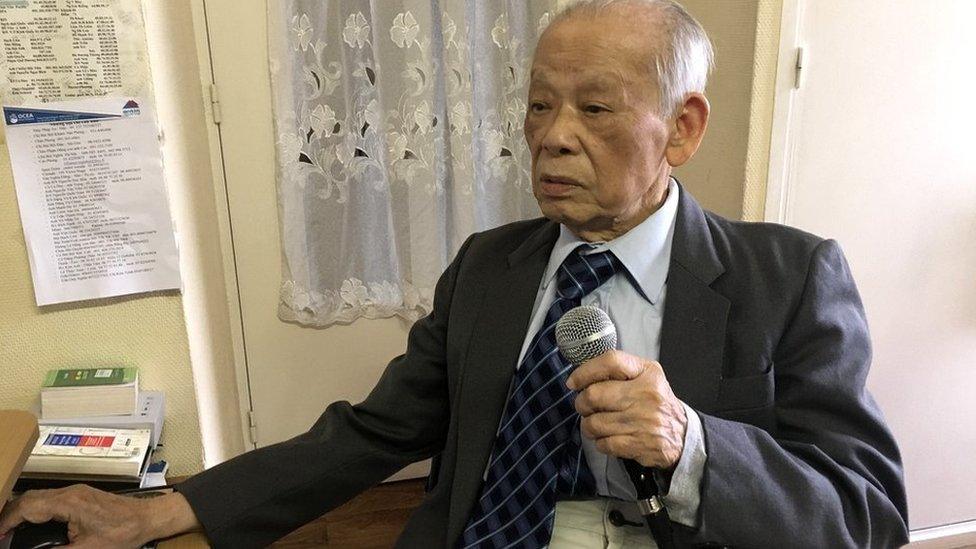Obituary: Bui Tin, the Vietnamese reporter scrubbed from the history books
- Published

When South Vietnam surrendered to the North in 1975, Bui Tin was there - as he was for many of his country's most important events
When US-backed South Vietnam fell in 1975, Bui Tin was there representing the triumphant communist North. But after the end of the war, he would become a bête noire, his name erased from Vietnam's records.
Tin died this week aged 90. The BBC's Nga Pham reports on the man she knew.
It was a hot dry afternoon on 30 April 1975. In the main meeting room of the Presidential Palace in Saigon, General Duong Van "Big" Minh and his men were sitting in tense silence.
On the big table there were glasses of water and bowls holding cashew nuts. The lunch menu that day offered two main dishes - beef tendon stewed with ginseng and fish cooked in sugar cane juice. But no-one was eating.
Just a few hours before, North Vietnamese tanks had crashed through the gates of the palace. And "Big" Minh had delivered a surrender note on the radio as the last president of the Saigon government.
Bui Tin was an army reporter and a senior lieutenant colonel with the North Vietnam army at the time, one rank below the one he would later hold when he defected to the West.
Yet he was the highest-ranking officer present when his team was ushered into the room where the defeated president was awaiting to transfer power. To which he responded: "But you have no power to transfer."
He was feverish, almost drunk on victory. Together with millions of Northerners, he'd spent 30 years fighting for what he firmly believed was a just, sacred cause.

Bui Tin (R) is seen in this 1975 photo taken as Saigon fell, with South Vietnam general "Big" Minh (C)
"Today is a joyful day, peace has prevailed. The war is ended and all Vietnamese are victors. Only the American imperialists are the vanquished," Mr Tin told the room.
Fast forward a couple of decades, and Vietnamese communist historians deliberately omitted Bui Tin's name from their reports on that historic day.
The reason was simple: Mr Tin became a dissident in exile.

Post-war Vietnam was far from the communist paradise that many had imagined. As ties with traditional ally China degenerated into conflict and Vietnam found itself isolated in the world arena, Hanoi struggled with a crippled economy and a fractured society. The regime proved incapable of economic management and popular discontent soared.
Bui Tin felt the anger of his countrymen but, having risen to be deputy editor-in-chief of the party mouthpiece paper Nhan Dan, he also witnessed the leadership atrophy at first hand.
Invited to Paris in September 1990 to attend an annual event held by the French communist newspaper L'Humanité, he decided not to return to Hanoi.
Not many had seen it coming, as he was considered a staunch communist, one of the party elite.
But that's why his explosive broadcasts on the BBC afterwards shook the Communist Party's headquarters in Hanoi's Ba Dinh square.

Bui Tin (C) greets American troops in his time as a North Vietnam army spokesman
Do Van, a veteran journalist of the BBC Vietnamese Service, said: "At the beginning of 1990, when in Hanoi on a duty trip, I began noticing his [Mr Tin's] disillusionment with the regime.
"The following November, we met in Paris. He told me he'd submitted 'A Petition of a Single, Ordinary Citizen' to the Communist Party via the embassy in Paris, in which he expressed his grave concerns about the economic and political situation inside the country.
"He asked me to broadcast it on the Vietnamese Service."
The then-head of the Vietnamese Service, Judy Stowe, assigned Do Van to conduct a series of interviews with Mr Tin around his 12-point petition, which went on to be broadcast over six weeks. Bui Tin exposed the regime that he accused of "bureaucracy, irresponsibility, egoism, corruption and fraud".
"Every Vietnamese is troubled by the country's present situation," he said. "There are acute economic problems, a return of galloping inflation, mounting prices and daily erosion of living conditions of civil servants and cadres."
Bui Tin called for efforts to build "a truly democratic regime with the people at the core". He also petitioned to change the country's name from the Socialist Republic to the Democratic Republic of Vietnam, and the Communist Party to the Labour Party of Vietnam "to get back to the true meaning of our battle".
But his insights into communist leaders's closely guarded private lives were what earned him the mighty wrath of official Hanoi.

More lives in profile

It was a journalistic coup for the BBC.
Vietnamese listeners were glued to their transistor radios every night during those weeks, secretly passing around photocopied transcriptions. Bui Tin's "Following Ho Chi Minh: Memoirs of a North Vietnamese colonel (1995)" dealt a powerful blow to the legitimacy of the Communist Party.
Until the last day of his life, Bui Tin was labelled a traitor by Vietnamese official channels. His death was not mentioned in any of the Vietnamese newspapers, not even those that he once edited.

Born to a noble family during French colonial rule, Bui Tin became a Communist Party member at 19. His father was a court mandarin but later joined the nationalist Viet Minh movement led by Ho Chi Minh and eventually became chairman of the new National Assembly.
Thanks to his father's close relationship with President Ho, Bui Tin had access to the Party's top echelon. He fought under the command of the national hero General Vo Nguyen Giap and got wounded during the famous battle in Dien Bien Phu which ended the war against the French.
But thanks to his job as an army correspondent, he was present at many of the country's historic moments, including the departure of US troops in 1973 and the invasion of neighbouring Cambodia in 1979, when Vietnamese troops toppled the murderous Khmer Rouge.

Bui Tin in later years - he was rarely able to see his family while he lived in exile in Paris
"My father was the most dedicated journalist," Bui Bach Lien, Bui Tin's daughter, told the BBC from her house in Hanoi.
"He was always there in the field, covering events with the utmost passion."
His frequent reporting trips meant Bui Tin was never around when Lien and her younger brother were growing up, but she insisted he was a "wonderful dad".
"He taught us about right and wrong, how we should feel about the country as a citizen," she said. "He loved Vietnam."

More on the Vietnam War

Mr Tin's defection had serious consequences for his family, especially during the 1990s. They were questioned and harassed. Lien saw her father in person for the last time in 2015 during a secret visit to Paris.
In one of their last telephone conversations, Lien recalled her father asking: "Are you angry with me for all the troubles?" Her reply was: "Never. You are our father."
Those who knew Bui Tin also knew he would not return to Vietnam as he wouldn't be able to speak out ever again.
Yet he always dreamed about returning to the homeland. The email address Mr Tin used the longest was LienBat - the name of his ancestral village just outside Hanoi.
Returning home was a far-fetched dream that died with him.